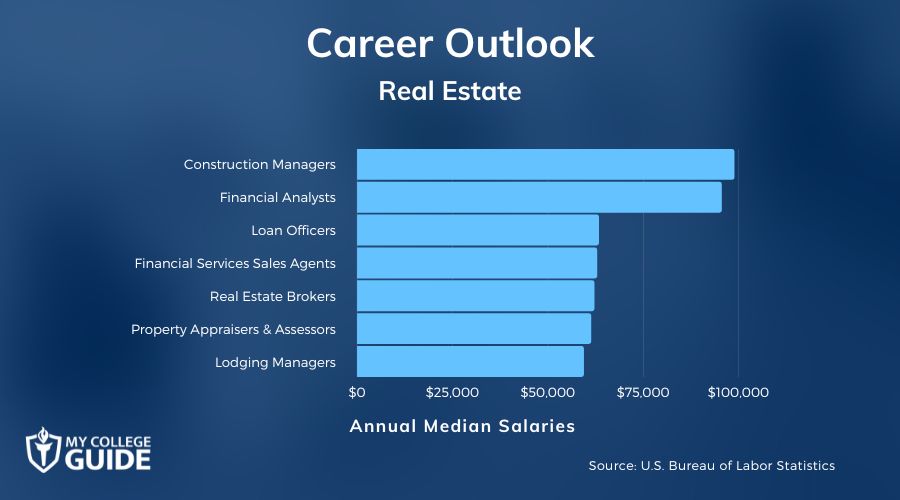Real estate is a highly competitive field, but online real estate degrees can help you get ahead.

Earning a bachelor’s in real estate can help you demonstrate to colleagues and clients that you are an expert in the field and can provide quality aid in helping them appraise or purchase their next home or business.
Editorial Listing ShortCode:
You can read on to take a look at the requirements of getting into the booming field of real estate and how a degree in real estate can help.
Online Bachelors in Real Estate Degrees

A real estate bachelor’s degree can help you learn the ins and outs of property sales, management, and construction. Real estate programs focus on practical skills and knowledge that can help you succeed in a variety of careers.
These are some of the topics you will likely study while earning an online degree in real estate:
- Housing and property laws and regulations
- Market analysis
- Lease negotiation
- Asset management
- Investments
- Property appraisals
- Finance
Some colleges and universities offer degree concentrations to tailor your degree to your specific career interests. Possible specializations include commercial real estate, finance, and construction management.
Editorial Listing ShortCode:
When you choose a type of real estate degree, it’s important to consider which elements of the industry you find most interesting. For example, a real estate development degree is best suited to a career as a property developer who improves real estate to increase its value.
Graduating with your bachelor’s degree in real estate may strengthen your resumé when applying for positions with a wide range of employers, such as:
- Mortgage companies
- Real estate brokerages
- Banks
- Investment firms
- Government agencies
These organizations often hire real estate professionals as real estate agents, mortgage brokers, property appraisers, and construction managers.
You may also use a bachelor’s in real estate as a stepping stone toward a master’s or doctorate degree. Advanced programs will give you opportunities to research and gain unique expertise in your preferred areas of study.
Real Estate Careers & Salaries

The most common goal for real estate students is to work as a real estate agent or broker, positions that involve assisting buyers and sellers with property transactions. Brokers, unlike agents, are also responsible for managing a team of employees.
Although many of the students pursuing bachelor in real estate degrees online plan on becoming agents or brokers, there are many other career paths available. If you’re interested in finance, a real estate bachelor’s degree may help you qualify for a position as a loan officer or financial analyst who specializes in funding and investments related to real estate.
You may even take on a management role, such as property manager or lodging manager, or work as a property value appraiser.
According to the Bureau of Labor Statistics, these are popular careers for graduates of real estate bachelor’s degree programs.
| Careers | Annual Median Salaries |
| Construction Managers | $98,890 |
| Financial Analysts | $95,570 |
| Loan Officers | $63,380 |
| Securities, Commodities, and Financial Services Sales Agents | $62,910 |
| Real Estate Brokers | $62,190 |
| Property Appraisers and Assessors | $61,340 |
| Lodging Managers | $59,430 |
| Property, Real Estate, and Community Association Managers | $59,230 |
| Real estate sales agents | $49,980 |
| Insurance Sales Agents | $49,840 |
Real estate careers in finance and management are projected to experience especially fast growth, according to the BLS. With a growth rate of 18%, lodging managers are expected to grow much faster than the average for all occupations.
Editorial Listing ShortCode:
Financial analysts (9%) and construction managers (8%) are also expected to experience accelerated growth. Specific job availability and salaries are dependent on a number of factors, including location, work experience, and education.
Real Estate Bachelor’s Curriculum & Courses

While the curriculum varies from school to school, bachelors in real estate online degrees typically focus on the legal and financial components of the industry.
These are courses that are common to real estate degree programs and what they typically entail:
- Introduction to Real Estate: This course provides an overview of the core principles, terminology, and concepts involved in real estate and is often a requirement for state licensure.
- Real Estate Law: In this class, you can learn about the laws and regulations that apply to real estate transactions, including purchases, sales, development, and leasing.
- Real Estate Investment: This class explores investment strategies, financing, and decision-making skills related to real estate.
- Real Estate Finance: This course introduces the key components of mortgages, including sources of funds and the role of public and private financial institutions.
- Commercial Bank Practice: This course focuses on how bank funds are allocated through loans and investments.
- Investment Analysis and Portfolio Management: If you are interested in the financial aspects of real estate, this course can give you the opportunity to learn how to construct a portfolio, formulate investment policies, and analyze securities.
- Real Estate Market Analysis: Understanding the market is vital to success in real estate, and this class presents key concepts, methodologies, and tools that are used in real estate analysis.
- Real Estate Appraisal: In this course, you can learn about appraisal methods, the appraisal process, and real property analysis.
- Global Real Estate Markets: This class offers insight into real estate in different regions around the world, with an emphasis on investments, currency concerns, taxes, and legal issues.
- Real Estate Management: This course can help you develop the necessary skills to plan and manage residential buildings, commercial office buildings, and corporate workspaces.
Many real estate programs will also allow you to take electives that align with your interests and career goals.
How to Choose an Online Bachelor Degree in Real Estate Program

Choosing the right real estate degree program may feel overwhelming, particularly if you’ve found several schools that seem like a good fit. To narrow down your choices, it can be helpful to consider these specific features:
- Cost: Although your budget isn’t the only factor to consider, it’s an important one. It’s important to consider not only the cost of tuition but also any required fees and materials.
- Accreditation: Accredited schools typically offer the highest quality programs, and regional accreditation is often required for financial aid and transferring credits.
- Specialization: Some bachelor’s programs in real estate are focused on specific areas of the industry, such as global markets, management, or finance. You can look for a college that offers a degree concentration that is best suited to your skills and ideal career.
- Format: Online real estate degrees are completed through virtual platforms, but some programs involve synchronous classes that must be attended at certain dates and times. Other programs are more flexible and feature asynchronous courses that can be completed at the time that works best for you.
- Support services: Many online universities offer support services that are equivalent to in-person programs. Internship opportunities, career placement programs, and mentorships are some services you may want to look for.
You can learn a lot about a college program by visiting its website, but it may also be helpful to speak to an admissions counselor, reach out to alumni, and explore the college catalog.
Admissions Requirements

Every real estate bachelor’s degree program has a set of specific admissions requirements, but there are common requirements that many schools ask for, including:
- Test scores: Some schools will ask you to submit minimum scores from standardized tests, such as the SAT or ACT.
- Transcripts: Most schools require official transcripts from high school and any previously attended colleges and institutions. Many programs also require a minimum GPA, which will be listed on your transcript.
- Recommendations: These may be from instructors who can describe in detail why you would be a good fit for the program.
- Personal statement: This brief essay is an opportunity to explain your past experience and future goals.
In addition to these requirements, many schools also request an official application and an application fee.
Accreditation of Online Real Estate Degrees

Colleges and universities can apply for regional accreditation, which reflects that the school has undergone a stringent evaluation and meets high standards.
It’s generally easier to transfer credits from regionally accredited colleges, which may prevent you from having to repeat courses if you change schools before graduating. It can also make it easier to get into advanced degree programs.
Editorial Listing ShortCode:
Many employers prefer degrees from regionally accredited schools because they are more likely to offer up-to-date information, theories, and practices.
Real Estate Licensure and Certifications

To work in real estate, you may need to obtain a license. To obtain licensure, you’ll need to meet certain requirements, such as earning a degree, passing an exam, or holding a certification credential. Possible certifications include:
- Graduate Realtor Institute (GRI): Agents who have expertise in laws and regulations are eligible for GRI certification.
- Residential Management Professional (RMP): To earn an RMP certification, you must have managed at least 100 units.
- Certified Residential Appraiser (CRA): A CRI certification allows you to appraise properties with up to four housing units.
Receiving a certification generally requires a certain amount of education and professional experience.
Real Estate Majors Financial Aid and Scholarships

Typically, the first step to discovering what financial aid you qualify for is completing the Free Application for Federal Student Aid (FAFSA).
There are scholarships for those going into real estate specifically as well. You may also find other scholarships that meet your needs, such as those for adult learners, single parents, people of a specific race or religion, and so on. The admissions office at your school may also be able to help you find aid.
Real Estate Professional Organizations

Joining a professional organization is a unique opportunity to connect with other members of the industry and develop new skills. Popular real estate organizations include:
- Commercial Real Estate Women Network (CREW): CREW provides educational events, networking opportunities, and leadership development for women who work in real estate.
- National Association of Realtors (NAR): The NAR offers education, advocacy, and resources to real estate professionals.
- Society of Industrial and Office Realtors (SIOR): SIOR members have access to conferences, education, and a global network of realtors.
Some of these organizations require prospective members to meet strict standards related to their education and experience.
What Degree Do You Need to Be a Real Estate Agent?

While you can get into real estate without a degree, it can help you demonstrate your credibility and earn business in this highly competitive field. Real estate online degrees are available at all levels, but associate’s and bachelor’s degrees are the most common choices.
Editorial Listing ShortCode:
Some agents hold degrees in other related fields. Finance, economics, marketing, and online business degrees can complement a career in real estate. Even after you have earned a college degree, you may still need to complete additional real estate classes online as required by your state and then pass an exam to become licensed. The exact requirements vary by state.
What Can You Do with a Degree in Real Estate?

While it is most common to pursue a career as a real estate agent or broker with this degree, there are many other promising careers you may pursue as well, like management or business careers.
You might qualify for a position as a financial analyst or a loan officer specializing in real estate funding and investments. You may also move into a management position in real estate, lodging, or construction.
According to the BLS, careers for real estate brokers and sales agents are projected to grow as fast as the national average, whereas some possible positions are projected to grow even faster. For example, financial analysts and lodging managers have projected growth rates of 9% and 18%, respectively.
How Long Does It Take to Get a Real Estate Bachelor Degree Online?

The amount of time it takes to earn a bachelor’s degree in real estate depends on your enrollment status and the program’s requirements. Full-time students in a traditional program with 16-week semesters generally graduate in 4 years.
If you have transferable credits or attend an accelerated, year-round program, you may be able to finish your degree more quickly. If you are enrolled part-time, it may take one or more additional years to graduate. Special program requirements, such as internships, can also extend the timeframe.
What’s the Difference Between a Realtor vs. Real Estate Agent?
Real estate agents and realtors have many shared responsibilities, but there are notable differences between them.
| Realtor | Real Estate Agent |
|
|
If you’re already a real estate agent, becoming a realtor may help you network and advance in your career.
Is a Bachelor’s Degree in Real Estate Worth It?

Yes, a bachelor’s degree in real estate is worth it for many students. People rely on real estate professionals when they purchase and rent commercial properties and homes.
Editorial Listing ShortCode:
Real estate is also a versatile major that applies to a variety of areas, including finance, appraisals, sales, and management. According to the Bureau of Labor Statistics, growth for employees in real estate will be steady over the next several years. This includes real estate brokers and agents (5%) and property appraisers and assessors (4%).
Universities Offering Online Bachelor in Real Estate Degree Programs
Methodology: The following school list is in alphabetical order. To be included, a college or university must be regionally accredited and offer degree programs online or in a hybrid format.

American Public University offers a Bachelor of Business Administration. Various concentrations are available including Real Estate Construction and Portfolio Development or Real Estate Marketing Management. The program is fully online and requires 120 credits. Courses are 8 to 16 weeks long with start dates each month.
APUS is accredited by the Higher Learning Commission.

A BS in Business Administration with an area of study in Real Estate is offered through Arkansas State University. The program is entirely online. Up to 90 of the required 120 credits may be transferred into the program. Courses are 5 to 7 weeks long. The program does not grant licensure.
Arkansas State University is accredited by the Higher Learning Commission.

Fordham University offers the opportunity to earn a BS in Real Estate. Courses are available online and during the evenings on campus. Applicants should meet general education requirements. Courses are asynchronous and in an accelerated format. Potential courses include Global Real Estate Market and Principals of Real Estate Finance.
Fordham University is accredited by the Middle States Association of the Commission of Higher Education.

A BS in Business Administration can be earned through Liberty University. The program is fully online. Up to 75% of the required 120 credits may be transferred. Courses are 8 weeks long, and there are multiple start dates each year. On average, the program may be completed in 3.5 years.
Liberty University is accredited by the Southern Association of Colleges and Schools Commission on Colleges.

Middle Tennessee State University offers a BS in Commerce with a concentration in Real Estate. The program is mostly online with some on-campus courses. The program requires 120 credits. Credit for prior learning may also be available.
Middle Tennessee State University is accredited by the Southern Association of Colleges and Schools Commission on Colleges.

A BS in Business Administration with a concentration in Real Estate is offered through Old Dominion University. The program is available online and on campus. Up to 90 of the 120 required credits may be transferred into the program. Most courses are in an asynchronous format and offered in full- and half-terms.
Old Dominion University is accredited by the Southern Association of Colleges and Schools Commission on Colleges.

Purdue University offers a BS in Finance with a concentration in Real Estate. The program is entirely online and requires 180 quarter credits, including a capstone project. Courses are 10 weeks long with start dates throughout the year. There is also the opportunity to participate in a bachelors-to-master program.
Purdue University is accredited by the Higher Learning Commission.

The University of Arizona offers the opportunity to earn a BA in Finance with an emphasis in Real Estate Studies. The program is fully online and requires 120 credits. Courses are 5 to 6 weeks long and may include Legal Aspects of Real Estate and Ethics and Moral Reasoning.
The University of Arizona is accredited by the Higher Learning Commission.

A BBA in Finance with a concentration in Real Estate or a BBA with a concentration in Finance, Insurance, and Real Estate is offered through the University of Memphis. The program requires 120 credits. Courses are asynchronous and completely online. Credit for prior learning may also be available.
The University of Memphis is accredited by the Southern Association of Colleges and Schools Commission on Colleges.

The University of Wisconsin – Whitewater offers a BBA in Finance with a concentration in Real Estate. The program can be completed online or on campus. The program requires 120 credits. Courses are in an asynchronous learning format. Most courses follow a regular semester schedule, with accelerated courses available during winter and summer.
UW-Whitewater is accredited by the Higher Learning Commission.
Getting Your Bachelor of Real Estate Degree Online

Whether you enjoy finding the perfect properties for homeowners or helping small businesses locate funding for their stores, a real estate bachelor’s degree can be an asset.
Participating in a real estate program can give you the opportunity to learn about laws and regulations, financial practices, appraisals, and markets. You may also have the opportunity to receive real-world experience through internships or mentorships. This can help you develop the skills necessary to effectively negotiate real estate deals, evaluate properties, and develop contracts.
You can take the first step toward enrolling in a real estate program by researching accredited online colleges.
